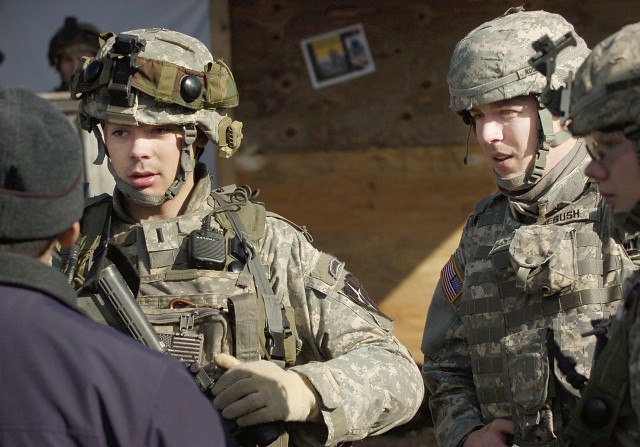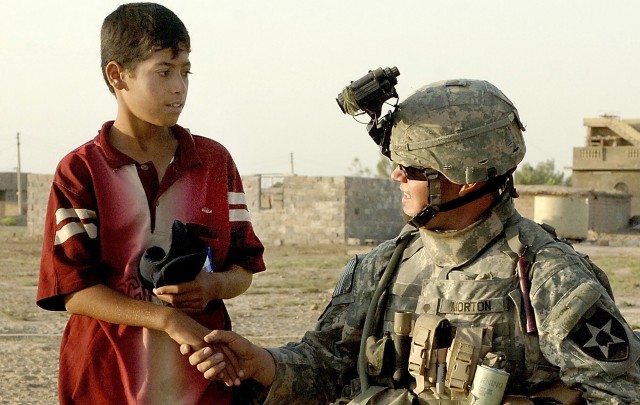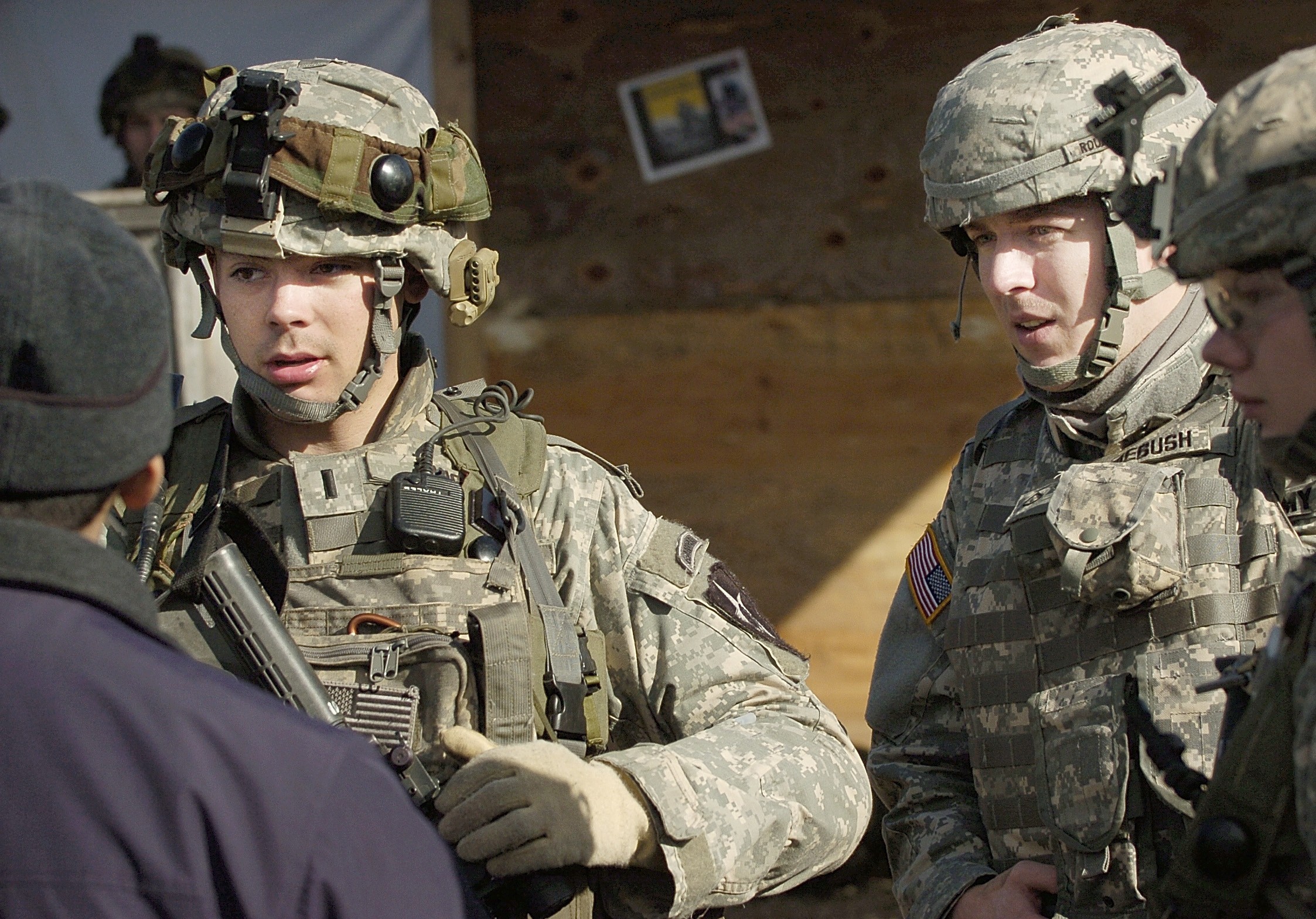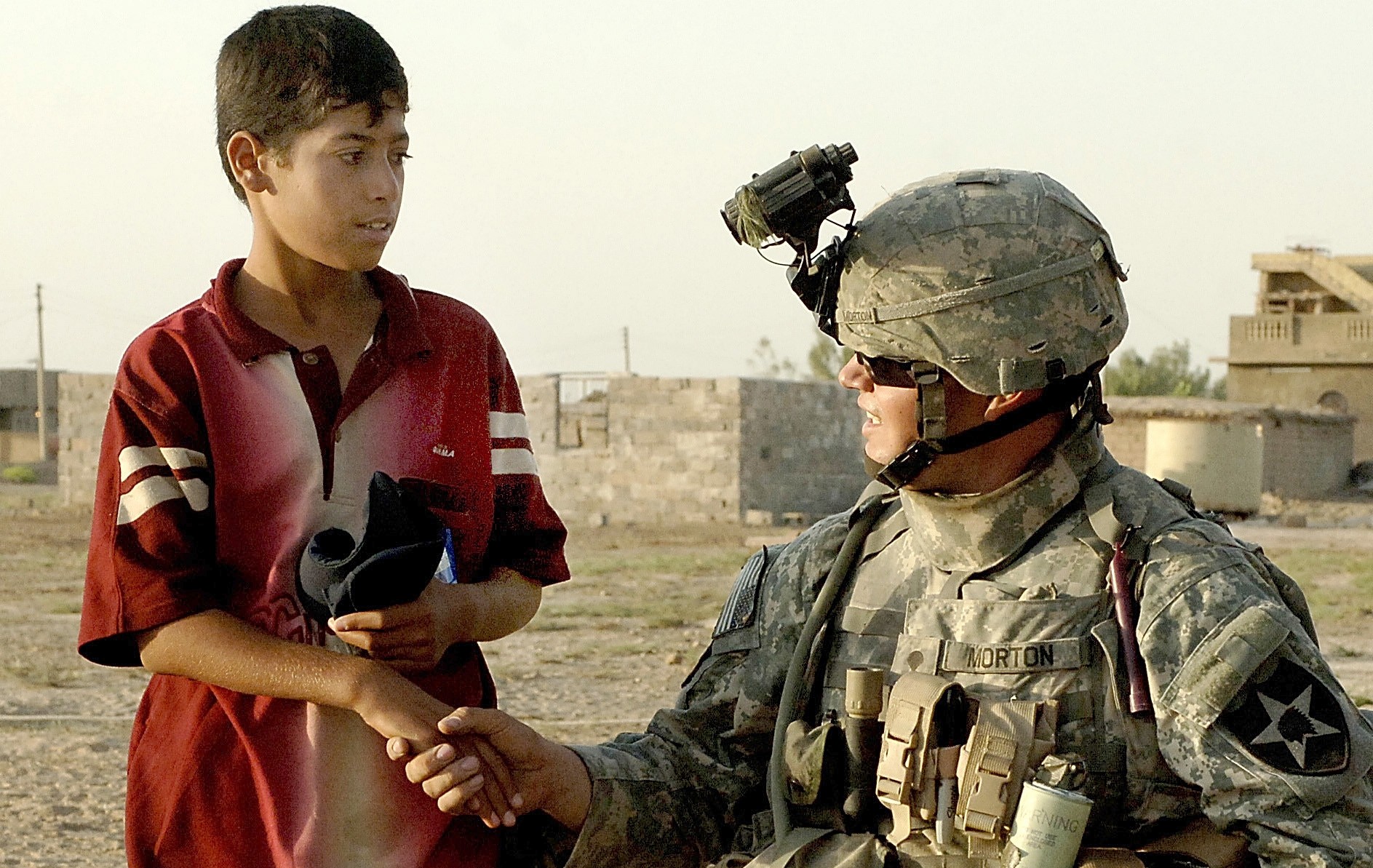FORT LEWIS, Wash. (April 11, 2008) -The next Stryker brigade scheduled to deploy from Fort Lewis is disproving the adage about too many cooks spoiling the broth. The more "chefs" contributing ideas to classes for teaching Soldiers language and culture, the better it gets.
The program has been so successful, in fact, that Fort Lewis' Language Enabled Soldier concept as executed by 5th Brigade, 2nd Infantry Division has been briefed to the Army's senior intelligence officer and its methods shared with the Defense Language Institute.
Under the language-enabled program, Soldiers from a variety of military occupational specialties are trained in language and culture, then return to their units to perform their normal duties. They become trusted advisors down to platoon level, better able to understand day-to-day cultural cues and customs encountered by small unit leaders.
"These Soldiers will be out in the neighborhoods off the forward operating base," Yvonne Pawelek said, the director of Fort Lewis' Regional Language Training Center. "They may be the only person with any knowledge of Arabic at all. They may be the ones talking to people in the street, taking tips on the phone. They're the ones trying to help their lieutenants begin to build rapport. They've helped with screening, house clearing, with locating IEDs. Even with this minimal level of language they're able to establish rapport, ask questions, follow directions, be this extra amount of language ability the unit would not have without an interpreter."
The Fort Lewis-based Stryker brigade currently in Iraq, 4th Brigade, 2nd Infantry Division, piloted the program two years ago. Leaders of the brigade report daily anecdotes from Iraq about the skill and utility of their LESs.
"LES was one of the things Col. (Jon) Lehr (4th Bde., 2nd Inf. Div. commander) emphasized," Col. Harry D. Tunnell, 5th Bde., 2nd Inf. Div. commander, said, "so we immediately adopted 4-2's program. Our first (video teleconference) we had, I asked him how they were working out. They were very happy with what they were doing."
"Every time I brief I say: 'This is the vision of Col. Jon Lehr and (intelligence officer) Lt. Col. Pat Mackin,'" Pawelek said.
Tunnell and his staff have embraced the program as a critical part of the brigade's preparations for deployment.
"It wasn't started from scratch by us," Maj. Andy Allen, 5th Bde., 2nd Inf. Div. intelligence officer said. "It was founded on a great program ... and what we did was put our own vision on it. Colonel Tunnell has taken it to a whole other level."
To the intensive language and cultural classes, 5th Brigade trainers have added a week of predictive profiling to recognize indicators in a threat situation, red team training to understand how non-western thinkers make decisions, Arab media training to interact with media in short focused messages and, for at least one Soldier per company, Mirror Image Training - a weeklong terrorism awareness class taught by Blackwater USA.
"This year, we're trying to master the program," Sgt. Madi said (first name withheld for security reasons). "The results were amazing."
Madi, an ethnic Lebanese U.S. Soldier with combat experience, is one of the cooks adding to the LES broth. He is an 09L, a MOS program begun shortly after 9-11, when the Army identified critical shortages and hired linguists proficient in 12 Arabic dialects in addition to Farsi, Pashtu and Kurdish.
Continuous feedback makes the LES program of instruction a fluid document. Anecdotes come from the field about situations in which deployed graduates find themselves. Scenarios are built on situations that have occurred and are occurring daily in Iraq. Far beyond the normal language instruction of greetings and ordering meals in restaurants, the scenarios contain real-world situations deployed Soldiers encounter daily.
"This program, I so believe in it," Madi said, "because it will allow the 09L to concentrate as interpreter on the higher level meetings while these Soldiers (assist) their platoon leaders and commanders."
Assigned to 5th Bde., 2nd Inf. Div., Madi coordinates between the foreign language center and his chain of command, oversees the students' daily activities and takes an active role in developing the curriculum. He authored a cultural checklist used by all Soldiers in the brigade to evaluate their interactions with Iraqis.
Meanwhile, Tunnell and his subordinate commanders are leading from the front.
"The command emphasis for 5th Bde., 2nd Inf. Div. is phenomenal," Pawelek said. "Colonel Tunnell and his commanders come here weekly every Friday. Even when they go (on temporary duty), they do make-up classes."
The brigade chain of command, like its LES students, copes with practical scenarios and learns the protocols of speaking to village leaders and working with interpreters.
"Each battalion has really taken the project to heart," Tunnell said.
Command emphasis on the program exacts a price. The 106 5th Brigade Soldiers in LES training are lost to their units for the 10 months of the course. While enrolled, learning language and culture is their top priority.
"I want him to have a set of capabilities," Allen said, "language skills and to understand the Arab mind set from the enemy perspective and from the Arab cultural mind set."
The 5th Bde., 2nd Inf. Div. design is for LESs to join company intelligence support teams, cells that will interpret cultural information and make assessments about it. In addition to the LES, the company command post will include an intelligence analyst, a chemical NCO trained as a formal analyst by a Military Intelligence branch mobile training team, and a tactical site exploitation technician trained in the key aspects of finding clues and evidence on objectives.
The Soldiers in the program volunteer to be LESs and are approved by their battalion commanders. They come with a necessary sense of purpose; three 4th Bde., 2nd Inf. Div. Soldiers have lost their lives performing LES duties.
"I am impressed how motivated the Soldiers are," Madi said. "We had 23 open slots for one class. We got over 50 (volunteers)."
Though LESs students have stayed separated from their units, the Soldiers have
participated in brigade training as
Arabic-speaking role players, civilians
on the battlefield, even in their future capacities as their Arabic skill levels permitted.
The brigade purposely started the classes early so the Soldiers would complete training before its mission readiness exercise, its final certification before deployment. The LESs will be fully integrated into it and exercised by it.
Classes are set to graduate April 18, June 20, Aug. 1 and Sept. 19. But they won't be done.
"Our goal is having them come back once a week for refresher training," Pawelek said. "The other plan is to slowly introduce the Iraqi dialect.
"Once their equipment is shipped, right before block leave, we want to bring them back for a five-day iso-immersion, pulling them back to have breakfast, lunch and dinner with their instructors, go to class 10 hours a day and have social activities at night," he said.
With input from the 5th Bde., 2nd Inf. Div. staff and chain of command, 09L
Soldiers, deployed LESs, the Fort Lewis Foreign Language Center faculty and staff, the concept of the language-enabled Soldier has grown past the original 4th Bde., 2nd Inf. Div. concept, meeting the growing needs of deployed leaders at all levels.
"The LES has gone far beyond, based on the foundation 4-2 set and based on Col. Tunnell's vision of his capabilities end state, what anyone expected," Allen said.
Don Kramer is a reporter with the Fort Lewis Northwest Guardian




Social Sharing